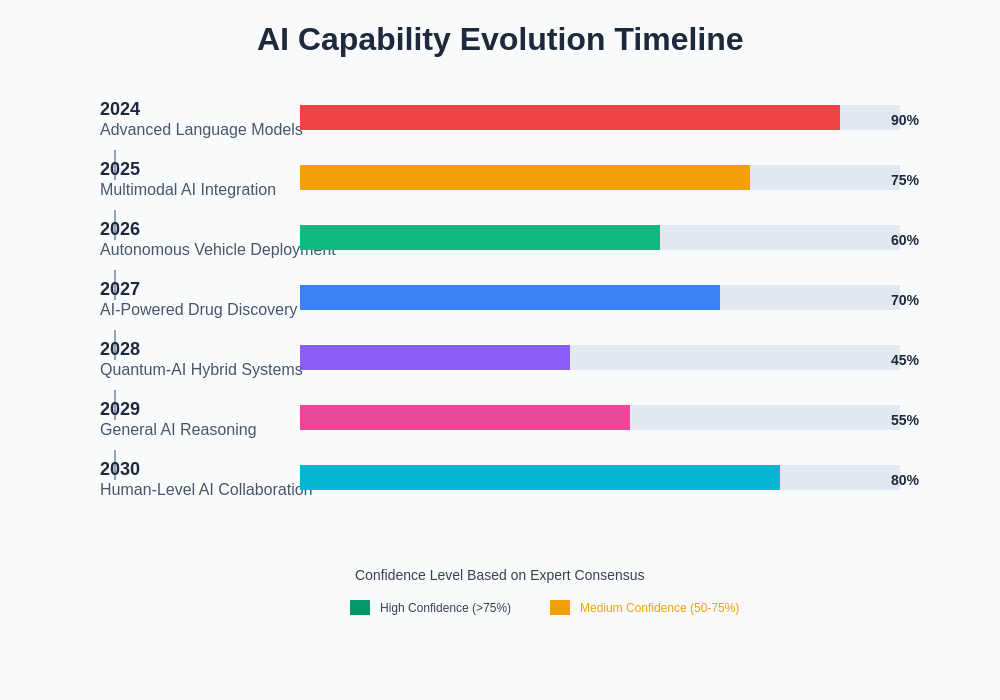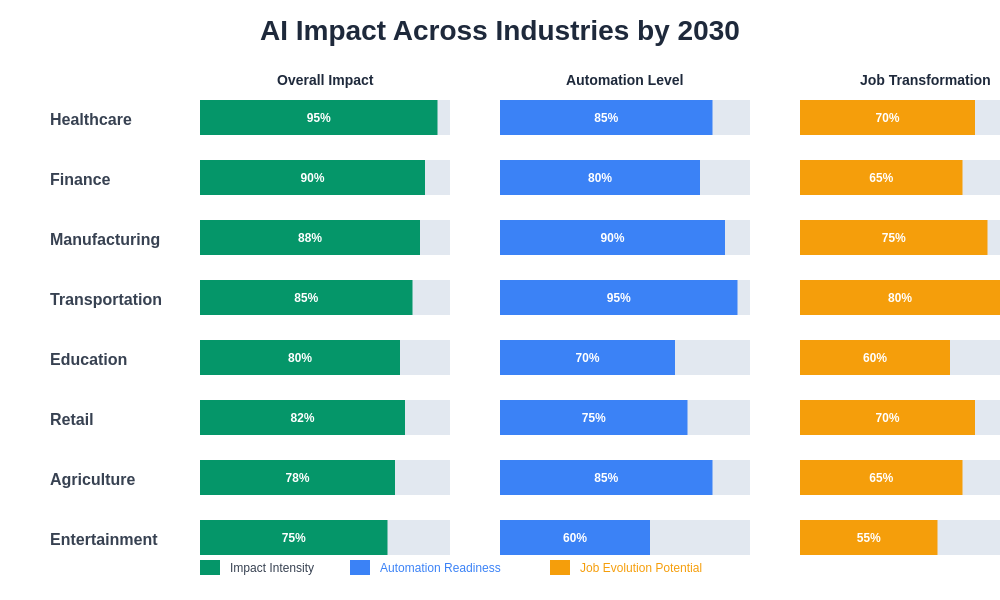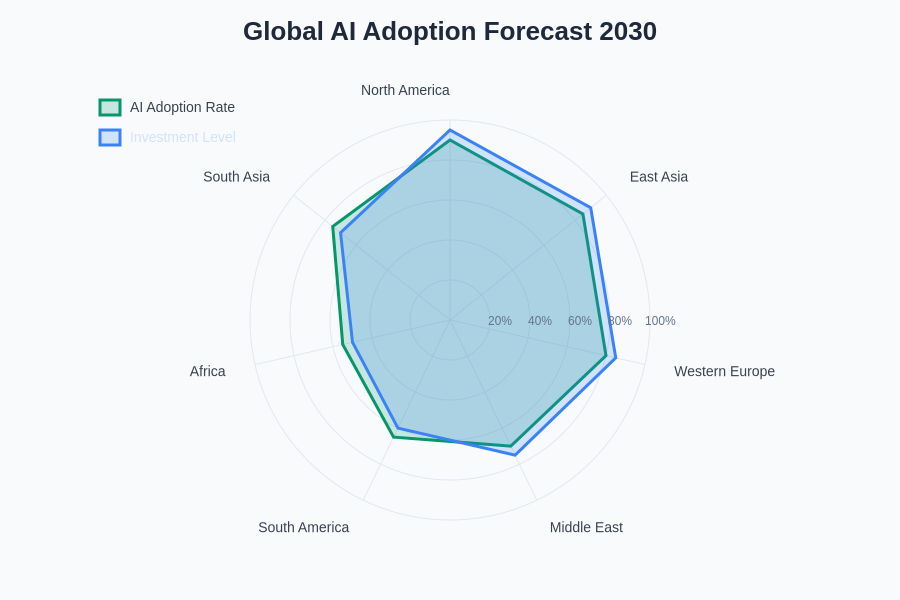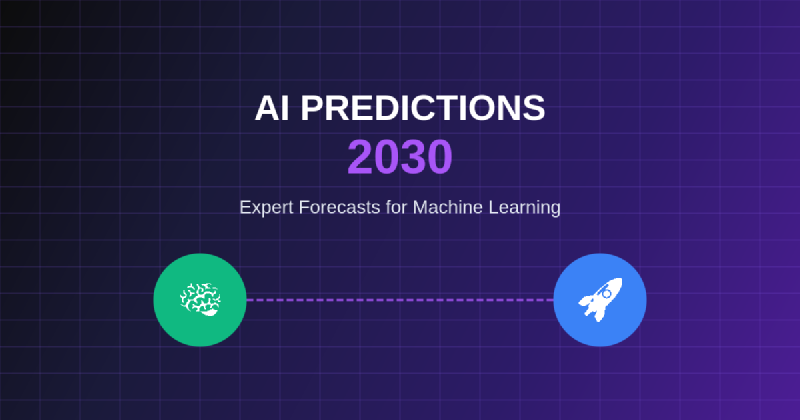The trajectory of artificial intelligence development has accelerated at an unprecedented pace throughout the 2020s, setting the stage for revolutionary transformations that will fundamentally reshape society, industry, and human interaction by 2030. Leading researchers, industry pioneers, and technology visionaries have converged on remarkably consistent predictions about the capabilities and applications that artificial intelligence will achieve within this decade, painting a picture of a world where machine learning systems become deeply integrated into every aspect of human civilization.
Stay updated with the latest AI developments as we approach these transformative milestones that will define the next era of technological evolution. The convergence of exponential computing power growth, breakthrough algorithmic innovations, and vast data accumulation is creating a perfect storm of conditions that will enable artificial intelligence to achieve capabilities that were previously confined to the realm of science fiction.
The Foundation of 2030 AI Capabilities
The technological foundation supporting AI predictions for 2030 rests upon several critical pillars that are already demonstrating remarkable progress. Quantum computing integration with classical AI systems promises to unlock computational capabilities that will enable the processing of previously intractable problems, while neuromorphic computing architectures will provide energy-efficient solutions that mirror the human brain’s remarkable efficiency in pattern recognition and learning processes.
Advanced semiconductor technologies, including specialized AI chips and novel computing architectures, are expected to deliver performance improvements of several orders of magnitude compared to current capabilities. These hardware advances will be complemented by breakthrough developments in algorithm efficiency, enabling AI systems to achieve superior performance with significantly reduced computational requirements. The synergy between hardware innovation and algorithmic advancement will create the computational substrate necessary for the sophisticated AI systems predicted to emerge by 2030.
Autonomous Systems Revolution
Expert forecasts consistently identify autonomous systems as one of the most transformative applications of AI technology by 2030. Fully autonomous vehicles will transition from experimental prototypes to mainstream transportation solutions, fundamentally altering urban planning, logistics networks, and personal mobility paradigms. The integration of advanced computer vision, real-time decision-making algorithms, and comprehensive environmental mapping will enable vehicles to navigate complex scenarios with safety and efficiency levels that exceed human capabilities.
Beyond transportation, autonomous systems will revolutionize manufacturing, agriculture, and service industries through the deployment of intelligent robots capable of performing complex tasks in unstructured environments. These systems will demonstrate adaptive learning capabilities that allow them to continuously improve performance through experience while maintaining robust safety protocols that ensure reliable operation in dynamic real-world conditions.

The progression toward full autonomy represents a fundamental shift from rule-based systems to adaptive intelligence that can handle unprecedented situations through reasoning and learning. This evolution will enable the creation of autonomous systems that can collaborate effectively with humans while maintaining independence in decision-making processes when appropriate.
Explore advanced AI capabilities with Claude to understand how current technologies are laying the groundwork for these revolutionary autonomous systems that will reshape industries and society by 2030.
Healthcare and Medical AI Transformation
The healthcare sector is positioned to experience perhaps the most profound transformation through AI advancement by 2030, with expert predictions indicating breakthrough capabilities in disease diagnosis, treatment optimization, and drug discovery. Artificial intelligence systems will achieve diagnostic accuracy that consistently exceeds human specialists across a wide range of medical conditions, while simultaneously providing personalized treatment recommendations based on individual genetic profiles, medical histories, and real-time physiological monitoring.
Medical AI will enable the development of personalized medicine approaches that tailor treatments to individual patients with unprecedented precision, significantly improving treatment outcomes while reducing adverse effects. Drug discovery processes, traditionally requiring decades of research and billions of dollars in investment, will be accelerated through AI-driven molecular design and clinical trial optimization, potentially reducing development timelines from years to months for certain therapeutic compounds.
Predictive health monitoring systems will continuously analyze biological markers, behavioral patterns, and environmental factors to identify potential health issues before symptoms manifest, enabling proactive interventions that prevent disease progression rather than merely treating existing conditions. This shift from reactive to predictive healthcare represents a fundamental reimagining of medical practice that will significantly improve population health outcomes while reducing healthcare costs.
Scientific Research and Discovery Acceleration
Artificial intelligence will become an indispensable partner in scientific research and discovery by 2030, with expert predictions indicating that AI systems will independently formulate and test hypotheses across diverse fields of study. Machine learning algorithms will identify patterns in vast scientific datasets that human researchers might overlook, leading to breakthrough discoveries in physics, chemistry, biology, and materials science.
Climate science will benefit significantly from AI-powered modeling systems that can process enormous amounts of environmental data to provide more accurate climate predictions and identify effective intervention strategies for addressing global warming. Materials science research will be revolutionized through AI systems capable of predicting material properties and designing novel compounds with specific characteristics, accelerating the development of advanced materials for renewable energy, electronics, and manufacturing applications.
The integration of AI into scientific instruments and laboratory automation will enable continuous, high-throughput experimentation that operates around the clock, dramatically increasing the pace of scientific discovery while reducing the cost and time required for research projects. This acceleration of scientific progress will have cascading effects across all technology sectors, enabling rapid advancement in fields ranging from energy storage to biotechnology.
Economic and Labor Market Evolution
Economic forecasters predict that AI will fundamentally reshape labor markets and economic structures by 2030, creating new categories of employment while transforming existing roles across virtually every industry sector. Rather than simply displacing human workers, AI is expected to augment human capabilities and create hybrid work environments where humans and AI systems collaborate to achieve superior outcomes compared to either working independently.
New professional categories will emerge around AI system management, training, and oversight, creating employment opportunities for individuals skilled in human-AI collaboration and AI ethics management. Traditional roles will evolve to incorporate AI tools and capabilities, requiring workers to develop new skills in AI interaction and management while leveraging their uniquely human capabilities in creativity, emotional intelligence, and complex reasoning.
Enhance your research capabilities with Perplexity to stay informed about emerging economic trends and employment opportunities in the AI-driven economy of 2030. The economic transformation will create unprecedented opportunities for innovation and value creation while requiring significant adaptation in educational systems and workforce development programs.
Educational System Transformation
Educational institutions will undergo radical transformation by 2030 as AI-powered personalized learning systems become the standard approach to education delivery. Expert predictions indicate that AI tutoring systems will provide individualized instruction that adapts in real-time to student learning patterns, preferences, and capabilities, enabling every student to receive personalized attention comparable to having a dedicated human tutor.
Curriculum development will be revolutionized through AI systems that continuously analyze learning outcomes and adjust educational content to optimize knowledge acquisition and retention. Language barriers in education will be eliminated through real-time translation and cultural adaptation technologies that make high-quality educational content accessible to students regardless of their native language or cultural background.
Assessment and evaluation systems will evolve beyond traditional testing methods to incorporate continuous monitoring of student progress through AI-powered analytics that provide detailed insights into learning patterns and identify areas requiring additional support. This comprehensive understanding of individual learning processes will enable educators to provide targeted interventions that maximize educational outcomes for every student.

The transformation of education will extend beyond traditional academic subjects to include AI literacy as a fundamental skill, ensuring that future generations are prepared to thrive in an AI-integrated world while maintaining critical thinking abilities that complement artificial intelligence capabilities.
Environmental and Sustainability Applications
Environmental sustainability will be significantly enhanced by AI applications that optimize resource utilization, reduce waste, and accelerate the development of clean technologies by 2030. Smart city infrastructure powered by AI will optimize energy consumption, traffic flow, and resource distribution in real-time, reducing urban environmental impact while improving quality of life for residents.
Agricultural systems will be revolutionized through precision farming techniques that utilize AI-powered analysis of soil conditions, weather patterns, and crop health to optimize planting, irrigation, and harvesting decisions. These technologies will increase crop yields while reducing water consumption, pesticide use, and environmental impact, contributing to global food security while promoting sustainable farming practices.
Energy grid management will be transformed through AI systems that optimize renewable energy integration, predict energy demand patterns, and manage energy storage systems to maximize efficiency while ensuring grid stability. The coordination of distributed energy resources through intelligent systems will accelerate the transition to renewable energy sources while maintaining reliable power supply.
Creative Industries and AI Collaboration
The creative industries will experience a renaissance through AI collaboration tools that enhance rather than replace human creativity by 2030. Expert predictions indicate that AI systems will serve as creative partners that can generate ideas, explore possibilities, and provide technical assistance while human creators maintain control over artistic vision and creative direction.
Music composition, visual arts, writing, and film production will all benefit from AI tools that can generate content variations, provide technical optimization, and handle routine production tasks, enabling human creators to focus on conceptual development and artistic expression. The democratization of creative tools through AI will lower barriers to entry for artistic expression while enabling new forms of collaborative creativity between humans and machines.
Interactive entertainment and gaming will be revolutionized through AI systems capable of generating dynamic content, creating personalized experiences, and serving as intelligent non-player characters that respond naturally to player actions and preferences. This evolution will create immersive entertainment experiences that adapt continuously to user preferences while maintaining engaging and challenging gameplay.
Communication and Language Technology
Language technology will achieve unprecedented sophistication by 2030, with AI systems providing real-time translation capabilities that preserve cultural nuance, context, and emotional tone across all major world languages. Expert forecasts indicate that language barriers will become largely irrelevant for both written and spoken communication, enabling global collaboration and cultural exchange on an unprecedented scale.
Natural language interfaces will become the primary method for interacting with technology systems, eliminating the need for specialized technical knowledge to access advanced capabilities. AI assistants will engage in sophisticated conversations that demonstrate understanding of context, emotion, and intent while providing helpful and accurate responses across diverse topics and domains.
Content creation and communication will be enhanced through AI tools that can assist with writing, editing, and presentation optimization while maintaining individual voice and style. These technologies will democratize access to high-quality communication tools while preserving the authentic expression that characterizes human communication.
Security and Privacy Considerations
Cybersecurity will be fundamentally transformed by 2030 through AI systems capable of detecting and responding to threats in real-time while continuously adapting to new attack vectors and methodologies. Expert predictions indicate that AI-powered security systems will provide comprehensive protection against both known and unknown threats through predictive analysis and behavioral monitoring.
Privacy protection will evolve to incorporate AI-powered systems that can provide personalized privacy controls while enabling beneficial data utilization for research and service improvement. Advanced encryption and privacy-preserving computation techniques will enable the benefits of data sharing while maintaining individual privacy rights and preferences.
The development of explainable AI systems will address concerns about algorithmic transparency and accountability, enabling users to understand how AI systems make decisions and ensuring that automated systems operate in accordance with ethical principles and regulatory requirements.
Regulatory and Ethical Framework Evolution
The regulatory landscape for AI will mature significantly by 2030, with comprehensive frameworks governing AI development, deployment, and operation across different sectors and applications. Expert consensus indicates that successful AI governance will balance innovation promotion with risk mitigation through adaptive regulatory approaches that can evolve alongside technological advancement.
International cooperation on AI standards and ethical principles will create global frameworks for responsible AI development while enabling beneficial applications to flourish across borders. These frameworks will address issues including algorithmic bias, transparency requirements, accountability mechanisms, and human oversight obligations.
Professional certification and training programs for AI practitioners will become standard requirements, ensuring that individuals working with AI systems possess the necessary skills and ethical grounding to develop and deploy these technologies responsibly. This professionalization of AI development will contribute to public trust and confidence in AI systems.
Infrastructure and Computing Evolution
Computing infrastructure will undergo revolutionary changes by 2030 to support the computational demands of advanced AI systems while maintaining energy efficiency and accessibility. Distributed computing networks will enable AI processing to occur closer to users and data sources, reducing latency while improving privacy and security through decentralized architectures.
Edge computing capabilities will bring AI processing power to mobile devices, IoT sensors, and embedded systems, enabling intelligent behavior in devices and systems that previously required cloud connectivity for advanced functionality. This distribution of AI capabilities will create resilient systems that can operate independently while contributing to larger networked intelligence.
Quantum-classical hybrid computing systems will tackle computational problems that are intractable for classical computers alone, enabling breakthroughs in optimization, simulation, and pattern recognition that will accelerate AI development across multiple domains.

The infrastructure evolution will create the technological foundation necessary for the ubiquitous AI applications predicted to emerge by 2030, ensuring that advanced AI capabilities are accessible to individuals, organizations, and nations regardless of their current technological capacity.
Conclusion and Future Implications
The expert predictions for AI development by 2030 paint a picture of unprecedented technological capability that will transform virtually every aspect of human society while creating new opportunities for innovation, collaboration, and problem-solving. The successful realization of these predictions will require continued investment in research and development, thoughtful consideration of ethical implications, and collaborative efforts to ensure that AI benefits are distributed equitably across populations and nations.
The convergence of multiple technological advances including quantum computing, advanced semiconductors, improved algorithms, and massive datasets will create synergistic effects that accelerate AI development beyond current projections. The key to successful AI integration lies not merely in technological capability but in developing frameworks for human-AI collaboration that leverage the strengths of both artificial and human intelligence.
The decade ahead promises to be defined by the transformation from narrow AI applications to more general artificial intelligence systems capable of reasoning, learning, and adapting across diverse domains. The successful navigation of this transition will require unprecedented cooperation between technologists, policymakers, ethicists, and society at large to ensure that the remarkable potential of artificial intelligence is realized in ways that benefit humanity while addressing the challenges and risks associated with such powerful technologies.
Disclaimer
This article presents predictions and forecasts based on current technological trends and expert opinions. The actual development of artificial intelligence may differ from these predictions due to unforeseen technological challenges, regulatory changes, or other factors. Readers should conduct their own research and consult with qualified experts when making decisions related to AI technologies. The effectiveness and timeline of AI developments may vary significantly based on continued research funding, technological breakthroughs, and societal acceptance of these technologies.
